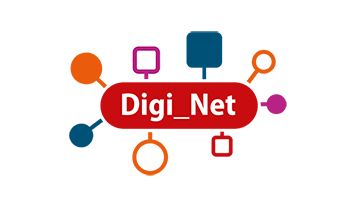Digi-Net

The research project Digi-Net "Success factors of digital networking for job and career development: The role of gender, digital literacy and competences" explores the effectiveness of online networking compared to traditional networking.
The aim is to identify different strategies in online networking as well as possible influencing factors such as gender, digital literacy and self-efficacy. In addition, recommendations are given on how online networking can be used successfully. The aim is to provide evidence-based support for individuals in actively shaping their careers in a digitalised world of work.
Background & Relevance
The professional world is changing. Digital transformation has and will profoundly change labour markets, organisations and professions. For example, virtual work, flexible time management and autonomy are now much more taken for granted and have replaced the traditional rigid processes in many professions. This is accompanied by more frequent career changes and less security, and the responsibility for career progression is shifted more to the individual.
Theoretical Framework
In career development research, networking is considered as an important competence that contributes to the preservation of professional resources and the achievement of success and satisfaction. Research in media psychology on online networking via professional networking sites (PNS) - such as LinkedIn or Xing - shows initial positive findings on their professional benefits. Theoretical approaches suggest that PNS have a lasting impact on career paths because they (1) can increase visibility, (2) are a platform for messages to many others and (3) also show who knows what and who knows whom.
Project description
Within the framework of the cooperation project "Success factors of digital networking for job and career shaping: The role of gender, digital education and competences" funded by the RheinEnergieStiftung, the benefits of PNS will be investigated. On the one hand, two studies will investigate the cost-benefit ratio of online vs. offline networking or their combination and which strategies can be identified and recommended for online networking. On the other hand, it will be analysed whether other influencing factors from the field of offline networking, such as gender differences or self-efficacy, are also evident in the online context. The results will be disseminated via specialist publications, workshops and congresses. There is also a complementary podcast called “Well-Connected: Kompetent digital Netzwerken”
At a Glance
| Category | Description |
|---|---|
| Research project | Digi-Net - Career self-management in a digitalized world: The impact of digital networking on resource attainment and the role of gender, digital literacy, and competences |
| Management | Prof. Dr. Ivonne Preusser Prof. Dr. Ivonne Preusser |
| Persons involved |
Lina-Sophia Falkenberg (TH Köln) Prof. Dr. Hans-Georg Wolff (Uni Köln) Elian Hermes (Uni Köln) |
| Sponsors | RheinEnergieStiftung Jugend | Beruf, Wissenschaft (RES) |
| Duration | 06/2023 – 12/2024 |

